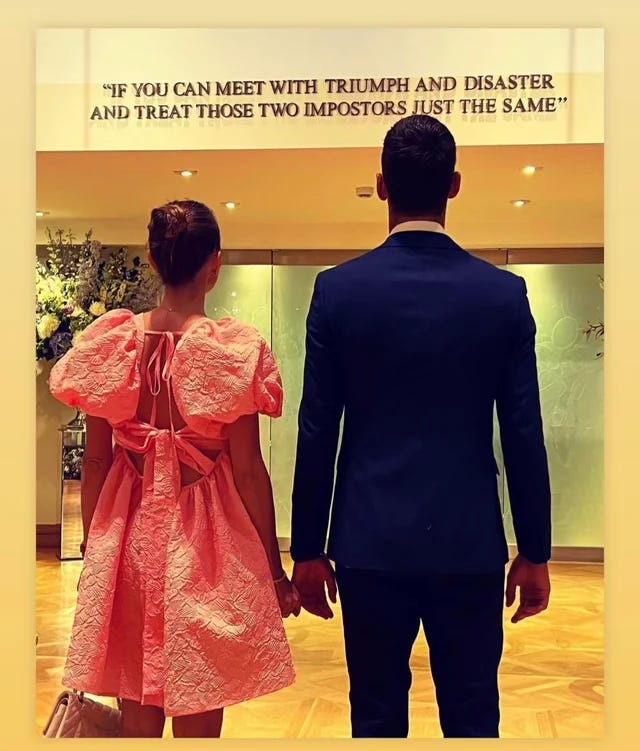“If –"
The end of all our striving
When a dear friend’s wife died suddenly not long ago, he included in her obituary a line from a poem by Rudyard Kipling. “She ‘walked with kings but never lost the common touch,’” my friend wrote of his wife. (It’s from Kipling’s poem, “If—“, which I’ve reprinted below.)
My friend is one of the most accomplished people I know: heads of state around the globe are regularly in touch with him; he gives lectures at major universities and advises economists, royalty, and elected world leaders; and he served as the United States Secretary of the Treasury in the George W. Bush administration. His wife, Carolyn, breathed that same rarefied air, of course, but my friend noticed that she was more at home in a deeper place, with everyday people and the universal longings of the soul.
By comparison, worldly distinctions of power, success, wealth, and celebrity are meaningless.
In Eugene Peterson’s plainspoken, colloquial translation of Philippians, Paul describes something similar:
“The very credentials these people are waving around as something special, I’m tearing up and throwing out with the trash—along with everything else I used to take credit for. And why? Because of Christ. Yes, all the things I once thought were so important are gone from my life. Compared to the high privilege of knowing Christ Jesus as my Master, firsthand, everything I once thought I had going for me is insignificant—dog dung. I’ve dumped it all in the trash so that I could embrace Christ and be embraced by him.”
Philippians 3:7-9
Peterson’s translation sometimes cracks me up. But it also hits home.
“Christ,” of course, is the way Christians label the “true life” of every human being[1], a “hidden mystery”[2] in all people, regardless of religious affiliation or none. “Christ” is how Christians talk about “the life which is the light of all people”[3]. When St. Paul says, “It is no longer I who live but Christ who lives in me,”[4] he is not saying he has become the victim of a body snatcher; he’s just saying he is now living the deeper, true life that thrives in us all, regardless of worldly circumstances, and that transcends our mortal life.
It is this Deeper Life to which we seek to give ourselves in daily contemplative practice, and I wonder if it is also what inspired Rudyard Kipling’s poem, “If—“:
____________________
“If –" by Rudyard Kipling
If you can keep your head when all about you Are losing theirs and blaming it on you, If you can trust yourself when all men doubt you, But make allowance for their doubting too; If you can wait and not be tired by waiting, Or being lied about, don't deal in lies, Or being hated, don't give way to hating, And yet don't look too good, nor talk too wise: If you can dream—and not make dreams your master If you can think—and not make thoughts your aim; If you can meet with Triumph and Disaster And treat those two impostors just the same;* If you can bear to hear the truth you've spoken Twisted by knaves to make a trap for fools, Or watch the things you gave your life to, broken, And stoop and build 'em up with worn-out tools: If you can make one heap of all your winnings And risk it on one turn of pitch-and-toss, And lose, and start again at your beginnings And never breathe a word about your loss; If you can force your heart and nerve and sinew To serve your turn long after they are gone, And so hold on when there is nothing in you Except the Will which says to them: 'Hold on!' If you can talk with crowds and keep your virtue, Or walk with Kings—nor lose the common touch, If neither foes nor loving friends can hurt you, If all men count with you, but none too much; If you can fill the unforgiving minute With sixty seconds' worth of distance run, Yours is the Earth and everything that's in it, And—which is more—you'll be a Man, my son!
____________________
[1] Colossians 3
[2] Colossians 1
[3] John 1
[4] Galatians 2:20
[*] “If you can meet Triumph and Disaster / And treat those two imposters just the same” – this is the inscription above the door to Center Court at Wimbledon.



I so look Forward to your Chapel, and it is always uplifting. It helps kep my spirits up the rest of the week. Thank you, Gary, for all you put into this community of spitits.
Barbara Nanly
Dear Gary, I am so sorry. I went back to search my email again and I saw "ZOOM" and it hit me that is the email I should be looking for to find the link to Contemplative Chapel. I came late today and have put a note on my computer.
Also, the last verses of the psalm remind me so much of Margaret Wise Brown's children's book, The Runaway Bunny. Surely, she was referencing the psalm. :) Thank you for today , Cad W.